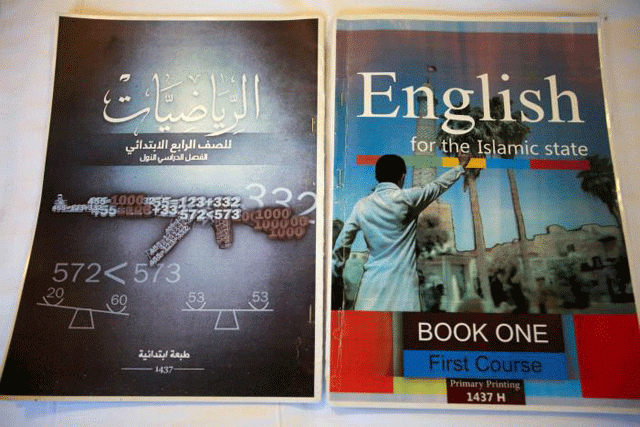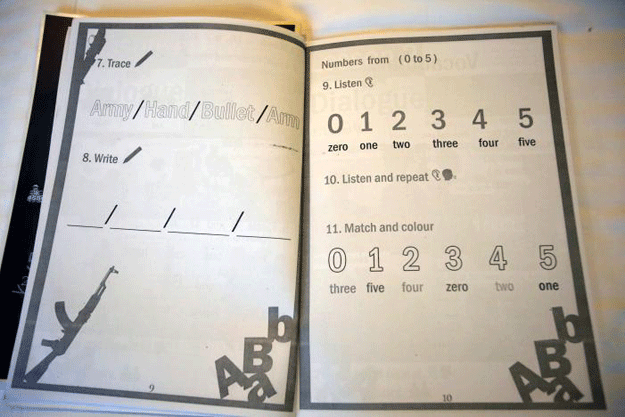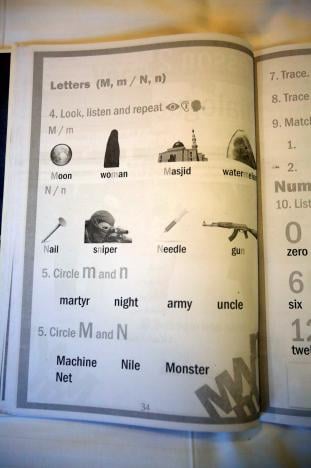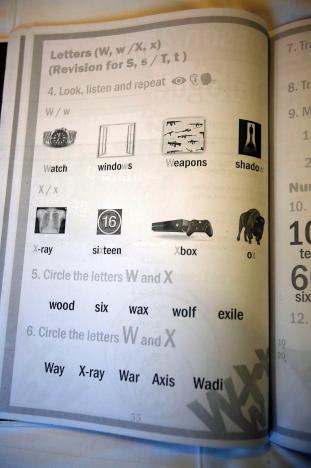'A' For Apple, 'B' For Bomb: In Mosul orphanage, IS groomed child soldiers
As the weeks pass they appear to absorb the group's ultra-hardline ideology

Math and English textbooks found in an Islamic State facility for child fighters, which include military imagery, are pictured in Mosul, Iraq, February 16, 2017. PHOTO: REUTERS
But as the weeks passed they appeared to absorb the group's ultra-hardline ideology, according to a worker at the former orphanage where they were housed.
The children, aged from three to 16 and mostly Shia Muslims or minority Yazidis, began referring to their own families as apostates after they were schooled by the militant fighters, he said.
 An English textbook found in an Islamic State facility for child fighters, which includes military vocabulary alongside ordinary words, is pictured in Mosul, Iraq, February 16, 2017. PHOTO: REUTERS
An English textbook found in an Islamic State facility for child fighters, which includes military vocabulary alongside ordinary words, is pictured in Mosul, Iraq, February 16, 2017. PHOTO: REUTERSThe boys were separated from the girls and infants, undergoing indoctrination and training to become "cubs of the caliphate - a network of child informers and fighters used by the militants to support their military operations.
The complex in Mosul's Zuhur district, which had been home to local orphans until they were kicked out by Islamic State, was one of several sites the militants used across the city.
It is now shuttered, its doors sealed with padlocks by Iraqi security forces.
Islamic State withdrew before Iraqi forces launched a US-backed offensive in October to retake the city, but during a visit last month there were still reminders of the group's attempt to brainwash dozens of children.
 An English textbook found in an Islamic State facility for child fighters, which includes military vocabulary alongside ordinary words, is pictured in Mosul, Iraq, February 16, 2017. PHOTO: REUTERS
An English textbook found in an Islamic State facility for child fighters, which includes military vocabulary alongside ordinary words, is pictured in Mosul, Iraq, February 16, 2017. PHOTO: REUTERSIn another room sits a stack of textbooks Islamic State had amended to fit its brutal ethos.
Arithmetic problems in a fourth-grade maths book use imagery of warfare, while the cover bears a rifle made up of equations. History books focus exclusively on the early years of Islam and emphasise martial events.
Another textbook entitled "English for the Islamic State" includes ordinary words like apple and ant beside army, bomb and sniper. Martyr, spy and mortar also appear alongside zebra crossing, yawn, and X-box.
21 terrorists killed during security crackdown in Pakistan after Sehwan blast
The word "woman" is depicted by a formless black figure wearing the full niqab covering. All faces in the books - even those of animals - are blurred, in keeping with an Islamic proscription against such images.
The orphanage worker, who was cowed into staying on after the militants took over in 2014, said girls who were brought to the centre were often married off to the group's commanders.
The man asked not to be named for fear of reprisals by Islamic State, which still controls the entire western half of Mosul. He was shot in the leg during recent clashes.
He said the militants, mostly Iraqis, taught the Shia children how to pray in the tradition of Sunni Islam and forced the Yazidis to convert.
They memorised the Koran, were taught to treat outsiders as infidels and conducted physical exercise in the yard, which has since grown over.
Old enough to fight
A pair of colourful plastic slides, and swing sets now sit untouched amid shattered glass, casings from a grenade launcher and a suicide bomber's charred remains - signs of the militants' fierce resistance as they retreated late last year.
The orphanage worker's comments could not be independently verified. But local residents gave similar accounts, and Islamic State has published numerous videos showing how it trains young fighters and even makes them execute prisoners.
 An English textbook found in an Islamic State facility for child fighters, which includes military vocabulary alongside ordinary words, is pictured in Mosul, Iraq, February 16, 2017. PHOTO: REUTERS
An English textbook found in an Islamic State facility for child fighters, which includes military vocabulary alongside ordinary words, is pictured in Mosul, Iraq, February 16, 2017. PHOTO: REUTERSNew batches of children arrived at the Zuhur orphanage every few weeks from outside Mosul, including a few from neighbouring Syria, while older boys were sent to the town of Tel Afar west of Mosul for intensive military training for duties including with Islamic State's courts or vice squad, residents said.
"After six months at the camps, some of the boys came back to spend a weekend with their younger brothers. They were wearing uniforms and carrying weapons," the orphanage worker said, fingering black and yellow prayer beads.
One of the boys, Mohammed, was killed last summer during the battle in the city of Falluja, west of Baghdad, he said, recounting how the other children wept upon learning the news.
A few weeks before the Mosul offensive began, Islamic State cancelled lessons and sent the boys to guard an airfield near Tel Afar which pro-government forces later seized, he said.
"I told them, 'If you see the army, drop your weapons and tell them you are orphans. Maybe they will spare your lives'".



















COMMENTS
Comments are moderated and generally will be posted if they are on-topic and not abusive.
For more information, please see our Comments FAQ